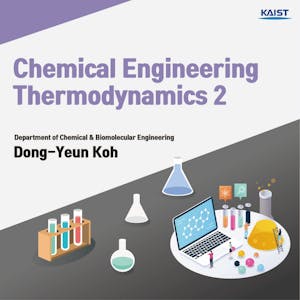An appreciation of thermodynamics is crucial for aspiring chemical and biomolecular engineers. This course delves into the principles of thermodynamics, essential for assessing process viability and applied in various engineering disciplines. Through a comprehensive exploration of the first and second laws, the course emphasizes the study of non-ideal single-component and multicomponent systems, solution thermodynamics, and chemical equilibrium.
The course's significance is underscored by the increasing focus on energy usage and transformation due to global challenges like rising demand, diminishing supply, and climate change. Students will gain a profound understanding of thermodynamics' role in addressing these critical issues, preparing them to contribute meaningfully to the field.
Throughout the eight-week program, students will explore topics such as fundamental property relations, chemical potential, phase equilibrium, ideal gas mixture models, fugacity, vapor-liquid equilibrium, Raoult's law, and more. The course integrates theoretical foundations with practical applications, laying a strong groundwork for students to tackle real-world engineering challenges.
Certificate Available ✔
Get Started / More Info
This comprehensive course is divided into eight modules, covering fundamental topics such as solution thermodynamics, ideal gas mixture models, phase equilibrium, vapor-liquid equilibrium, Raoult's law, and more.
The first module introduces the framework of solution thermodynamics, fundamental property relations, and chemical potential. Students will also delve into phase equilibrium and its significance in engineering processes.
Module two focuses on partial molar properties, ideal gas mixture models, and mixing properties. Students will gain insight into essential concepts for understanding thermodynamic systems and their behavior.
Module three delves into fugacity and fugacity coefficients for gas and solution phases, ideal solution models, and excess properties. These concepts are crucial for understanding separations and chemical equilibrium.
Module four explores vapor-liquid equilibrium for pure species and the Lewis/Randall rule. Phase equilibrium concepts are further expanded, providing students with a comprehensive understanding of system behavior.
Module five introduces the gamma/phi formulation of vapor-liquid equilibrium and the simplification of VLE. These concepts are essential for understanding phase equilibrium and system behavior.
Module six focuses on Raoult's law, including BUBL & DEW P, BUBL & DEW T, and modified Raoult's law. These concepts are crucial for understanding phase equilibrium in various systems.
Module seven explores properties from VLE data and fitting activity coefficient models to VLE data. Students will gain practical skills for analyzing and interpreting experimental data in thermodynamic systems.
Module eight concludes with VLE data reduction, providing students with a practical understanding of data processing and analysis in the context of vapor-liquid equilibrium.
Explore the fascinating world of Gastronomic Engineering in this course from Pontificia Universidad Católica de Chile. Gain insights into the scientific and engineering...
Introduction to Molecular Spectroscopy provides an in-depth exploration of UV/Visible, Infrared, and NMR spectroscopies, complemented by interactive presentations,...
Statistical Molecular Thermodynamics explores the relationship between molecular properties and macroscopic chemical systems.
Signaling actions of small molecules is a 6-week course providing a solid introduction to the fundamental principles underlying cellular signaling events controlled...